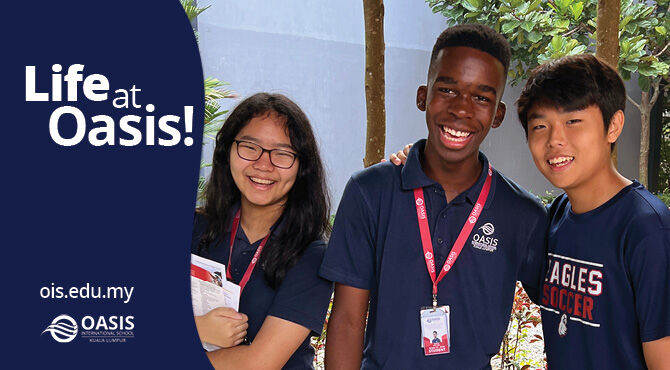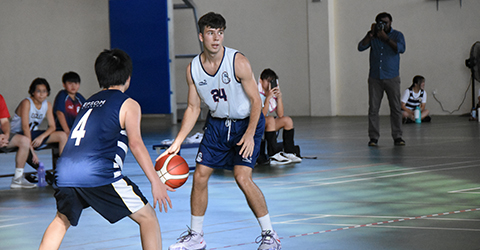Oasis International School
Oasis International School
About | Structure | Assessment | Contact

Education Team 17 November 2023Oasis International School – Kuala Lumpur is a community of students, parents, and qualified educators, working together as an Oasis network school, to instill in our school community: A passion for truth, a commitment to excellence, and an appreciation for diversity. To accomplish our mission, Oasis International School – Kuala Lumpur provides a United States educational experience that cultivates character, leadership, and innovation. We call this the Oasis Way.
The Oasis Way is exhibited through student learning outcomes. Our Students will positively impact the school, community, nation, and world, appreciate the unique qualities of the diverse world, and celebrate shared values. They will express an intrinsic desire for learning in and beyond the classroom, and pursue creativity and originality in their work and life.
Oasis International School – Kuala Lumpur is owned and operated by Oasis International Schools, a non-profit organization that is “committed to establishing and maintaining American-style, English-speaking international schools around the world.” Oasis’ network, over 40 years old, is based in the United States but stretches across the world with schools in 15 different countries. Oasis International Schools provides Oasis International School – Kuala Lumpur with resources, oversight, and support. Since its founding over 30 years ago, the Oasis International Schools network has created a legacy of academic excellence, prestigious college acceptance, and successful alumni.
Oasis International School – Kuala Lumpur offers an American educational program for students in Kindergarten to 12th Grade. Staffed by U.S.-certified teachers, OIS is academically challenging, integrated with cutting-edge technology, and centered on developing character in our students.
Students at OIS are challenged to appreciate the unique qualities of a diverse world and celebrate shared values. Words like ‘empathy’ and ‘understanding’ are more than just lofty ideals. At OIS, they are woven into our curriculum, embedded into our programs, and lived out by an international community of students and educators from all over the world who call OIS their home. They are also challenged to positively impact the school, community, nation, and world. Equipped with the content knowledge and 21st-century skills necessary to excel in today’s global community, students are then given a platform to connect their education to real-world problems. At OIS, students are not just our hope for a brighter future; they are our solution for a better today. Students at OIS are encouraged to develop an intrinsic desire for learning through the pursuit of creativity and originality in their work and life. Students are not simply trained to take a test. They are nurtured into life-long learners who view the world and their future as a unique opportunity to solve problems, create meaning, make improvements, and question the status quo. For the OIS graduate, learning never ends.
Overview of U.S. Curriculum
No two children are the same and often don’t learn the same way. The U.S. curriculum uniquely values a personalized learning approach. In class, teachers strive to differentiate and scaffold instruction; electives and after-school activities allow students to pursue subjects that pique their interests and talents. Additionally, the teaching environment can often be adapted to accommodate a student’s learning style.
Whether at a school in the United States or an international school with an American curriculum, some commonalities guide instruction which include the U.S. standards as well as a holistic and personalized learning approach. Classes are rooted in content that aligns with standards, such as the Common Core State Standards or the AERO Common Core Plus Standards for international schools using the U.S. syllabus. Standards hold schools accountable to challenge students academically, encourage them to think critically and demonstrate creativity, and ultimately, make sure the students are well prepared to attend university.
Another important aspect of the U.S. curriculum is a holistic approach. By focusing on educating the whole child, teachers ensure that the child’s intellectual needs are met while also providing opportunities for social development, promoting students’ physical health, and investing in students’ moral growth.
Overall School Structure
Typically, the academic year at U.S. schools is broken down into two semesters, each consisting of two quarters; formal reports are distributed quarterly, and credits are earned each semester. Students in the U.S. curriculum typically spend 13 years of study from pre-kindergarten to 12th grade. At all levels, English language arts, math, science, and social studies are core subjects. In addition, as part of having a holistic approach, schools provide opportunities for students to take classes in visual and performing arts, foreign languages, physical education, and technology.
Elementary School
Students who are around age 4 to 11 are in Kindergarten through 5th grade. These years are designed for the youngest students to build a strong foundation of knowledge, critical thinking skills, and leadership ability.
Middle School
Students who are typically aged 11 to 14 are in 6th to 8th grade. These three vital years, 6th to 8th grade, equip students as they prepare for high school. Developed specifically for young adolescents, middle school builds on students’ content knowledge and social skills.
High School
Students who are about age 14 to 18 are in 9th to 12th grade. Students work to complete a certain number of credits (based on the school’s requirements) to earn a high school diploma and to be prepared for universities in English-speaking countries around the world.

Assessment and Evaluation
Another aspect that sets U.S. education apart is how students are graded in classes. Assessments that observe student progress daily are most valuable for determining students’ understanding. In a single week, teachers monitor student learning in a variety of informal, low-pressure ways such as class discussions, group work, graphic organizers, writing assignments, peer assessments, quizzes, reflections, and projects. These assessments allow teachers to quickly realize when students understand or are struggling. These assessments also are used to create a learning portfolio that encourages students to reflect on their strengths and weaknesses. Portfolios can even help students get into elite universities since many are adopting a holistic admissions process to include a portfolio. Finally, parents have online access to grades for all assessments, giving them a complete picture of how their children are doing at any point during the school year.
Pathway to University
After completing all required credits, students earn a U.S. diploma that can take them to leading universities around the world. Students aren’t alone in their journey to get a diploma. Throughout high school, students have access to academic advising and university counseling. These counselors help students in their application to universities and assist with organizing testing for the PSAT, SAT, and ACT–assessments that measure the knowledge and skills that students learn in high school and need for academic success at university. Schools using the U.S. syllabus also often offer Advanced Placement (AP) courses to provide students with university-level academic courses that give them an advantage when applying to universities and for scholarships around the world.
.
Oasis International School Kuala Lumpur
Address: No. 1 Jalan Flora 2, Bandar Rimbayu42500 Telok Panglima GarangSelangor Darul Ehsan, Malaysia
Tel:+6 03 5525-8111
Email: info@ois.edu.my










